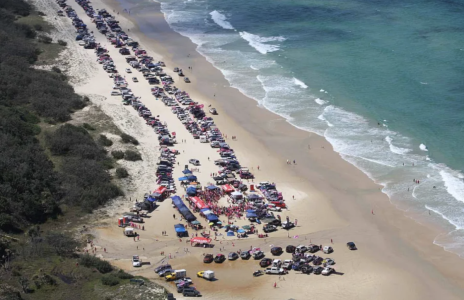New speed limit on this beach causes outrage: ‘Too much traffic’
By
Seia Ibanez
- Replies 8
The recent decision to slash the speed limit on a popular stretch of Australian beach has sparked a fiery debate among locals, campers, and road safety advocates.
The picturesque Cooloola beach stretch, adjacent to the Teewah Beach camping area, is a haven for holidaymakers and four-wheel-drive enthusiasts.
However, the tranquillity of this coastal paradise has been disrupted by a significant change.
The speed limit on a 14km section has been halved to 40 kilometres per hour, a move that has been met with both applause and indignation.
On one side of the debate, road safety experts like Dr Lauren Pearson from Sustainable Mobility and Safety Research at Monash University are hailing the decision as a victory for public safety.

Pearson emphasised the 'overwhelmingly positive' impact of reduced speed limits in mixed-use areas where vehicles, pedestrians, and especially children coexist.
‘Reducing speeds in these kinds of areas where we have a whole mix of people, cars and other vehicles moving around is the smart choice,’ Pearson said.
‘Beaches and campgrounds are the kind of places where people, and particularly kids, should be able to enjoy a space without risking serious injury. Speed reductions are one of the more cost effective steps we can take toward making our streets safe and usable by people of all ages and abilities.’
According to Pearson, the benefits of such measures are 'insurmountable’. They enhance road safety and contribute to the liveability of local communities.
With road trauma still the leading cause of death for children in Australia, Pearson argued that lower limits in places where people and motor vehicles mix are crucial, especially as cities experience rapid population growth.
However, not all locals are convinced. The backlash has been swift and vocal, with many residents and visitors feeling that they are paying the price for the actions of a reckless few.
The debate has spilled over onto social media, with almost 700 responses to a public reminder issued by a local business owner.
‘Don't allow P-platers on the beach and that will stop 70 per cent of the problems there,’ one person suggested.
Some argue that the new speed limit is impractical, with one commenter stating, '40km/h in soft sand is ridiculous. I understand the safety aspects, but this is over the top.’
‘Educate your kids that this is a road. It's what my parents [have] done and [what] I've done with mine.’'
‘It won't be long and they will close these beaches to motorists. I give it five years. Too much traffic on the beaches now,’ somebody else suggested.
Pearson stressed the need for reduced speed limits in areas where people and vehicles interact, saying, ‘are needed now more than ever’ across Australia.
‘[Particularly] as we are seeing rapid population growth across all cities,’ she said.
 Have you visited the Cooloola Beach stretch recently? Do you think the new speed limit is a sensible safety measure or an overreaction? Share your thoughts and experiences in the comments below.
Have you visited the Cooloola Beach stretch recently? Do you think the new speed limit is a sensible safety measure or an overreaction? Share your thoughts and experiences in the comments below.
The picturesque Cooloola beach stretch, adjacent to the Teewah Beach camping area, is a haven for holidaymakers and four-wheel-drive enthusiasts.
However, the tranquillity of this coastal paradise has been disrupted by a significant change.
The speed limit on a 14km section has been halved to 40 kilometres per hour, a move that has been met with both applause and indignation.
On one side of the debate, road safety experts like Dr Lauren Pearson from Sustainable Mobility and Safety Research at Monash University are hailing the decision as a victory for public safety.

Some locals were outraged over the new speed limit on Cooloola beach. Credit: Rainbow Beach Community News
Pearson emphasised the 'overwhelmingly positive' impact of reduced speed limits in mixed-use areas where vehicles, pedestrians, and especially children coexist.
‘Reducing speeds in these kinds of areas where we have a whole mix of people, cars and other vehicles moving around is the smart choice,’ Pearson said.
‘Beaches and campgrounds are the kind of places where people, and particularly kids, should be able to enjoy a space without risking serious injury. Speed reductions are one of the more cost effective steps we can take toward making our streets safe and usable by people of all ages and abilities.’
According to Pearson, the benefits of such measures are 'insurmountable’. They enhance road safety and contribute to the liveability of local communities.
With road trauma still the leading cause of death for children in Australia, Pearson argued that lower limits in places where people and motor vehicles mix are crucial, especially as cities experience rapid population growth.
However, not all locals are convinced. The backlash has been swift and vocal, with many residents and visitors feeling that they are paying the price for the actions of a reckless few.
The debate has spilled over onto social media, with almost 700 responses to a public reminder issued by a local business owner.
‘Don't allow P-platers on the beach and that will stop 70 per cent of the problems there,’ one person suggested.
Some argue that the new speed limit is impractical, with one commenter stating, '40km/h in soft sand is ridiculous. I understand the safety aspects, but this is over the top.’
‘Educate your kids that this is a road. It's what my parents [have] done and [what] I've done with mine.’'
‘It won't be long and they will close these beaches to motorists. I give it five years. Too much traffic on the beaches now,’ somebody else suggested.
Pearson stressed the need for reduced speed limits in areas where people and vehicles interact, saying, ‘are needed now more than ever’ across Australia.
‘[Particularly] as we are seeing rapid population growth across all cities,’ she said.
Key Takeaways
- The speed limit at Cooloola beach stretch, adjacent to the Teewah Beach camping area, has been reduced to 40km/h by Gympie Regional Council.
- Some locals are opposed to the change, believing it penalises the majority for the actions of a few irresponsible individuals.
- Road safety expert Dr Lauren Pearson supports the reduction, emphasising the evidence of the benefits of lower speed limits for community safety.
- Despite some opposition, enforced speed reductions aim to improve road safety, especially where children and families are present.







